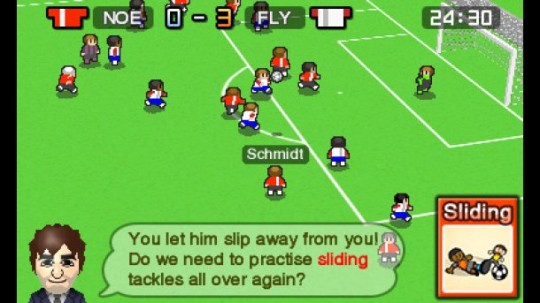
Drawing upon the same addictive qualities as the smartphone/tablet game Football Chairman, Nintendo Pocket Football Club is a game that sees you take control of a small time football club and attempt to progress and improve with them as you build them up to the big time. Whereas with some other football management titles having a detailed knowledge of what’s going on in football is pretty much essential to get the most out of the game, with Nintendo Pocket Football Club you’re not playing with real-life footballers and so it’s more of a pick up and play title where in-depth knowledge of real-life football isn’t really beneficial. People that know much about football can definitely enjoy Nintendo Pocket Football Club, it’s not a requirement though and even if you know very little about football you can definitely have fun with this game.
Unlike in Football Manager where you have to watch each match like a hawk, constantly making tactical alterations in an attempt to stay ahead of the opposition, with Nintendo Pocket Football Club you can only make major changes to the team before kick-off and at half-time unless you’re making a substitution, meaning that each match is a lot more hassle free and you can just sit back and enjoy things a little more; you’re more a football fan and less a stressed out statistical analyst. Whilst you may not be able to make changes as freely as you’re able to in Football Manager though, that’s not to say that you can completely ignore what’s going on in each match as you do need to work out where each players’ strengths and weaknesses lie so that you can determine which of their attributes need most work and therefore decide which areas to improve upon in the next training session. It’s not the same level of intensity as with Football Manager as there’s not the same sort of pressure on you to constantly make alterations to remain on the front foot, it’s certainly still a pretty important aspect of the game though and if you’re not really paying attention to what’s going on in each match then you won’t be in as strong a position as you could be when it comes to improving upon your squad.
With each match taking roughly 10 minutes to play through, there’s no option to simulate any part of a match and so each match must be played out in full. Friendly matches can be played in weeks when you have no competitive matches and these also last about 10 minutes, practise matches can also be played though and will only set you back about 5 minutes as they’re half the length of regular matches. With no ability to sim through matchess, if you want to skip past friendly/practise matches then you must therefore lose out on picking up training cards which are absolutely vital for improving your team. Player abilities are improved by applying training routines with cards that are picked up in matches, so whilst skipping practise matches may save you time and get you to your next competitive match more quickly, it won’t benefit you at all in the long run and will in fact set you back in your progress as you’ll miss out on the opportunity to gain hugely important training cards. Training cards can be applied singularly or in multiples, with the possibility to unlock special combos when applying particular training cards together. Getting the most out of your training cards is basically a process of trial and error, and attempting to hit upon special combos is all part of the fun of the game that helps make Nintendo Pocket Football Club such an addictive and enjoyable experience.

Although you may not be able to appreciate it from looking at screenshots, Nintendo Pocket Football Club actually has an incredibly impressive match engine and the way that each match ebbs and flows is really gripping to watch. As you’re watching each and every match in its entirety you really get a feel for how your team is improving, and rather than just sitting there and watching the best/worst bits of how your team is playing, you get to see absolutely everything in Nintendo Pocket Football Club and this therefore allows you to know exactly where your team is at as you experience both the highs and the lows of everything that your players go through. It may be a little annoying at times that you have to play each match out in its entirety, by playing them this way you can certainly begin to appreciate how much work must have gone into the game to make each match play out so much like a real life football match though, with all the ugly scrappiness included as well as the free-flowing beauty that can sometimes be found in the sport.
There are only 10 matches in each league campaign, with a cup to play in as well though in addition to all the practise/friendly matches, a season can take quite a while to play through and this is therefore an area in which the game distances itself from mobile gaming and firmly presents itself as a more traditional football management title. Nintendo Pocket Football Club can perhaps be seen to situate itself in an awkward territory then as it has the addictive qualities and simplicities that would make for a fantastic speedy handheld game, yet pairs these qualities up with a fairly slow paced structure that requires many hours of gameplay and dedication in order to properly progress. It bridges the gap between mobile game and fully fledged management title and it’s hard to tell who the game is specifically aimed at as it’s probably too time consuming for the mobile crowd and maybe a little too casual for most Football Manager fanatics. There’s no denying that Nintendo Pocket Football Club is an incredibly fun game to play and it’s certainly an extremely addictive title, it definitely sits itself firmly between two markets though and this therefore means that many people are likely to miss out on the game thinking that it’s not really for them when truly they’d really quite enjoy it.
Nintendo Pocket Football Club doesn’t have the same depth or options that you get with Football Manager, Football Manager Classic’s introduction in 2012 demonstrated that there’s certainly a call for a less involved version of the game though, and Nintendo Pocket Football Club strips things back even further to provide a football management sim all the more suited to the casual gamer. There’s still enough tactical awareness required to make the game a fun management title, it’s certainly not as involved as Sports Interactive’s annual series though and although this may be quite off-putting for some, plenty are likely to be pleasantly surprised with Nintendo Pocket Football Club and happily invest a fair few hours in the game.
Nintendo Pocket Football Club is stripped back and in many ways rather basic, its simplicity is key to its charm though and its fantastic match engine is also at the very heart of the game’s success.

UK based film graduate with a huge passion for music, sports and video games.
